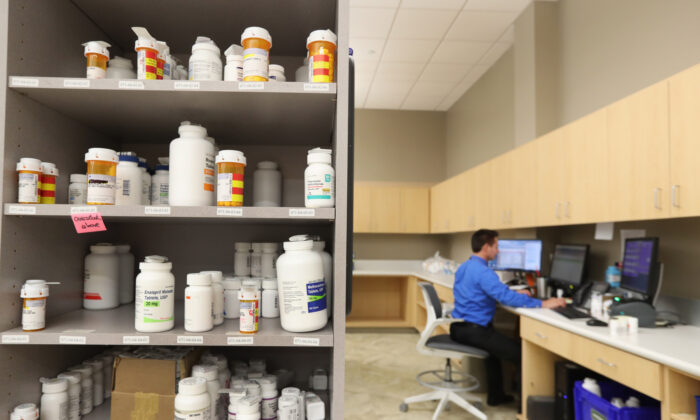‘Unhealthy Partisanship’: Move Afoot to Improve the Workings of Parliament
WASHINGTON—America’s dependence on China for thousands of medicines has been a concern for years, but the recent coronavirus (officially known as COVID-19) outbreak has heightened those concerns. It has disrupted the inspection of drugs and medical devices in China, prompting warnings from experts.
In January, the State Department announced a highest-level warning not to travel to China amid the rapidly-spreading virus. As a result, the U.S. Food and Drug Administration (FDA) also recalled its inspectors from China, raising concerns about the quality of drugs that are being imported from the country.
“The FDA is not currently conducting inspections in China,” the agency said in a statement.
In general, the FDA conducts nearly 500 inspections a year in the country for drugs, foods, and medical devices. Inspections scheduled for February and March are postponed and will be conducted at a later date, the agency stated.
“We are keenly aware that the outbreak will likely impact the medical product supply chain, including potential disruptions to supply or shortages of critical medical products in the United States.”
Recently, there has been a surge in orders of some essential medical devices through distributors, such as masks, respirators, surgical gowns, and gloves. In order to mitigate the risk of supply disruptions for such products, the FDA stated it would be able to accelerate “review of alternate supply to prevent shortages.”
Personal protective equipment such as face masks and N95 respirators are in high demand in the United States, according to Robert Kadlec, assistant secretary for preparedness and response at the U.S. Department of Health and Human Services.
“When you go to Home Depot today, you can’t find them. They’ve come off the shelves,” he said on Feb. 18 at an event hosted by the Council on Foreign Relations.
The retailer Home Depot’s website also shows that supplies for respirator masks are limited due to the outbreak.
“The problem is that there’s a huge demand. Supply is going to get constrained because of raw materials [from China],” Kadlec said.
He also noted that 50 percent of respirator masks are used by the health care industry while the rest is used by the private sector for home improvement purposes such as painting or sanding.
So Americans should be mindful that buying up masks for non-health purposes is “going to really hamper the ability of the health care industry to protect itself.”
Supply disruptions could extend to other areas as 80 to 90 percent of U.S. health care products—raw materials, active pharmaceutical ingredients, and finished products—are outsourced mainly from China, he said.
Moreover, the production of many active pharmaceutical ingredients is centered in China’s Hubei Province, the epicenter of the coronavirus outbreak, former FDA Commissioner Scott Gottlieb said on Feb. 12 at a Senate committee hearing.
“Most drug makers have a one to three months of inventory of drug ingredients on hand. But these supplies are already being drawn down,” he said in his testimony.
Troubling Dependence on China
China is the dominant supplier of thousands of medicines found in U.S. homes and used in hospitals, posing a national security threat.
Americans “trust blindly, unquestioningly, the purity of the medicine we take,” from antibiotics to chemotherapies, from antidepressants to painkillers that are made in China, according to Rosemary Gibson, a senior advisor at the Hastings Center, a bioethics research institute.
Gibson co-authored the book, “China RX: Exposing the Risks of America’s Dependence on China for Medicine,” which makes the case for bringing drug manufacturing home.
In the 1990s, the United States, Europe, and Japan manufactured 90 percent of the global supply of the key ingredients for medicines and vitamins, according to the book.
China, however, changed this global picture dramatically.
Beijing’s “Made in China 2025” blueprint has laid out ambitious goals to dominate and control certain key sectors, including the pharmaceutical industry. By injecting billions of dollars in subsidies and training a large pool of talented chemists, China has managed to advance its capability in this sector and drive Western manufacturers out of the market.
Worldwide dependence on a single country for life-saving medicines makes the United States vulnerable to supply chain disruptions, Gibson told The Epoch Times.
“This is a giant wake-up call,” she said, adding that the coronavirus outbreak has exacerbated this vulnerability problem.
Lack of Inspections
The falloff in FDA’s inspection capabilities is also creating risks for American consumers.
According to Gibson’s book, the FDA was created in 1906 to oversee medicines made in the United States. With increasing imports from China, the federal agency opened its first office in Beijing in 2008, which was also the first FDA facility outside the United States.
However, the agency was ill-prepared to inspect foreign facilities on a large scale—and Chinese drug plants went out of their way to make inspections exceedingly difficult.
“We do know that in the past, there had been serious problems with drugs that were manufactured in China,” Rep. John Garamendi (D-Calif.) told The Epoch Times.
“Their quality was questionable. In some cases the drugs were tainted with deadly chemicals,” he added.
The poor quality of made-in-China medicine had already taken its toll. In March 2008, the FDA announced that heparin made in China and sold through Illinois-based Baxter Healthcare Corp. was contaminated. The tainted heparin killed four people and injured 350 in the United States.
“The issue of quality control in China with regard to these drugs is a major and important issue. The current recall of American inspectors only heightens concern about quality,” Garamendi said.
This article is from the Internet:FDA Suspends Inspection in China, Warns of Medical Supply Shortages
